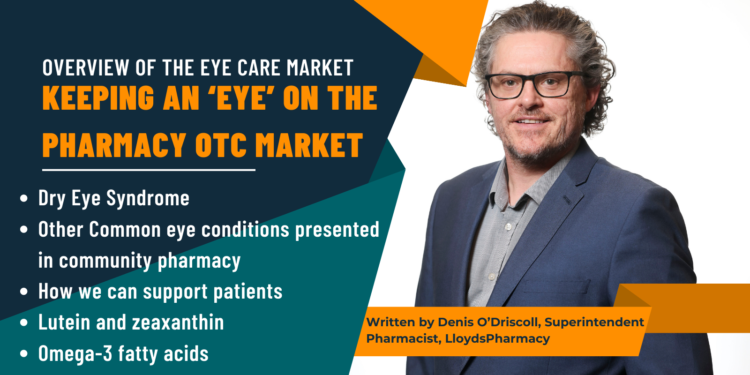Overview of Market
As pharmacists have now become the first port of call for many patients, it is necessary to have basic knowledge of common eye disorders and their appropriate interventions and treatment.
Recent data analysis for IQVIA have placed eyecare into the Top 5 Minor OTC classes by value accounting for 29% of the total. In that period there has been a 9% growth.
Dry eye disease is increasing in prevalence with GPs reporting a 65% increase in the past decade alone potentially relating to the use of modern technology. The impact of COVID 19 with increased screen usage and stress has had a significant effect on dry eye disease with 72% of patients advising that it had a negative effect on their lives.
From recent data across all dry eye treatment categories there has been an increase of greater than 17% from the previous year. This clearly demonstrates that pharmacists’ intervention in this area is critical as over a third of patients will attend the pharmacy seeking support and advice on how to help with their symptoms.
It is important that patients are advised on the proper use of ophthalmic drops so that the medication is applied correctly. Leaflets that instruct patients on how to instil eye drops should be made readily available and should be used to reinforce the explanation.
There has also been an increase in recent years in the number of eye care supplements available over the counter in pharmacies. By far the most common OTC eye supplements are those used to prevent and slow the progression of Age-related Macular Degeneration (AMD).

Dry Eye Syndrome
Dry eye syndrome is due to decreased production of tears or excessive tear evaporation and causes discomfort and soreness. Patients may also complain about a sensation of feeling grit in their eye. Underlying causes of dry eye include Sjögren’s syndrome, aging, staring at a screen for too long, blinking problems, and environmental factors.
Additionally, patients taking such medications as oral contraceptives, antihistamines, and beta-blockers may experience dry eyes.
Dry eye syndrome can be managed using non-prescription artificial tear products. Many OTC products are available, and preservative-free formulations are recommended if the patient experiences itching and irritation with the drops. Dryness can also be prevented by the use of humidifiers.
Age-related Macular Degeneration (AMD)
AMD is a leading cause of vision loss. It’s mainly associated with aging, but some forms of macular degeneration affect younger people as well.
AMD occurs when there’s deterioration of light-sensitive cells in the macula area of the retina. This is the part of the eye responsible for:
• recording what we see and sending the information to our brains
• seeing fine detail
• focusing
Other Common eye conditions presented in community pharmacy
• Red Eye
• Allergic Conjunctivitis
• Bacterial Conjunctivitis
• Subconjunctival Haemorrhage
• Blepharitis
• Floaters
• Styes
• Watery Eyes
• Foreign Body in the Eye
• Meibomian Cysts (Chalazia)
How we can support patients
Questions to ask during an eyecare consultation in the pharmacy (Elton M. Ocular conditions from A to Z (ii). Pharm J. 2007;278:255-258):
• How long have you had this problem?
• Have you had this problem before?
• What is the pattern of occurrence of this problem?
• Has it gotten worse or better over time?
• Is there any pain?
• Is there any discharge?
• Is your vision affected?
• Do you know what the problem could be? Is there an obvious cause?
• Have you been using a computer screen for prolonged periods of time?
Symptoms that require immediate referral (Elton M. Ocular conditions from A to Z (ii). Pharm J. 2007;278:255-258):
• Pain in the eyes
• Blurred or distorted vision
• Worsening symptoms
• Any doubt about the diagnosis
• No improvement with any OTC medications previously used. What vitamins and nutrients may help Eye Health?
Lutein and zeaxanthin
Lutein and Zeaxanthin are carotenoids. Carotenoids are pigments found in plants and in your retina. Supplementing these pigments helps increase their density in your retina. They also absorb high-energy blue and ultraviolet light that can damage your eyes. Dark green leafy vegetables are the primary source of lutein and zeaxanthin, as well as other colourful fruits and vegetables like broccoli, corn, peas, persimmons and tangerines.
Omega-3 fatty acids
Photoreceptors cells in the retina contain a large quantity of omega-3 fatty acid. It’s believed that docosahexaenoic acid (DHA), a type of omega-3 fatty acid, helps in the development of retinal cells. It’s also thought to have a role in reducing inflammation and helping cells of the retina and the cornea heal and regenerate after damage due to light exposure and aging.
Salmon, tuna and other coldwater fish are the best sources of omega-3 fatty acids and can help reduce inflammation, enhance tear production and support the eye’s oily outer layer.
Zinc
Also found naturally in your eyes, zinc is a powerful antioxidant that protects against cell damage.
Zinc plays a vital role in bringing vitamin A from the liver to the retina in order to produce melanin, a protective pigment in the eyes. Impaired vision, such as poor night vision and cloudy cataracts, has been linked to zinc deficiency. For natural dietary sources of zinc, try red meat, oysters and other shellfish, and nuts and seeds.
Vitamin B1 (thiamine)
Vitamin B1 is essential for the health of your eyes. Known as one of the “anti-stress” B vitamins, vitamin B1 reduces inflammation.
Vitamin C
Vitamin C may lower the risk of developing cataracts and when taken in combination with other essential nutrients, it can slow the progression of age-related macular degeneration and visual acuity loss. For your daily dose, try incorporating oranges, grapefruit, strawberries, papaya, green peppers, and tomatoes into your diet.
Some practical tips to promote eye health
• Drink plenty of water.
• Keep your eyes moist with artificial tears. There are a wide range of lubricants for the eyes available in community pharmacies.
• If you live or work in a building with air conditioning, the filter should be changed as required.
• Avoid environments with dusty or dirty air.
• Use cold compresses, cucumbers, or dampened and cooled green or black tea bags on your eyes.
• Do not smoke. Smoking damages blood vessels in the eyes and can lead to cataracts, macular degeneration, and other sight problems.
• Protect your eyes from ultraviolet light. Wear sunglasses when you’re outdoors and avoid staring directly into bright lights.
• Maintain a healthy weight and an active lifestyle.
• After age 60, get a dilated eye exam each year.
• Make sure your diet contains plenty of green leafy vegetables, spinach, corn, oranges, eggs, yellow carrots. These foods contain high levels of nutrients, including those found in the AREDS2 formulation.










